Captured: Mysterious oyster killers

University of British Columbia researchers have apprehended tiny, elusive parasites that have plagued oysters from British Columbia to California.
First reported in 1960, Denman Island disease is caused by Mikrocytos mackini, a parasite that infects mainly Pacific oysters, and leads to unsightly green lesions and death.
"M. mackini has eluded capture for more than 50 years because it lives inside the oyster's cells and has proved impossible to grow and study in a lab," says Patrick Keeling a professor in UBC's Department of Botany who led the microbial investigative team.
The research team from UBC and the Department of Fisheries and Oceans isolated the parasites from infected oysters and analyzed their genes. Details are published today in the journal Current Biology.
"We figured out where M. mackini came from in the evolutionary tree of life – it is part of an enigmatic group of amoebae called Rhizaria that was only itself discovered a few years ago," says Keeling, director of the Centre for Microbial Diversity and Evolution at UBC and a Fellow of Canadian Institute for Advanced Research.
"These parasites have an extremely reduced metabolism. They can't survive in oxygen and its mitochondria – or cellular powerhouse – can't produce energy, so they probably steals most things from the oyster host in order to survive."
While not considered a health threat to humans, the Denman Island disease makes the raw delicacy unappealing. In B.C., oyster production in 2011 totalled 7,500 tonnes and was valued at $9.2 million.
Journal information: Current Biology
Provided by University of British Columbia

















